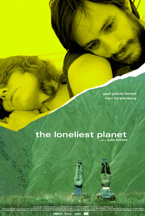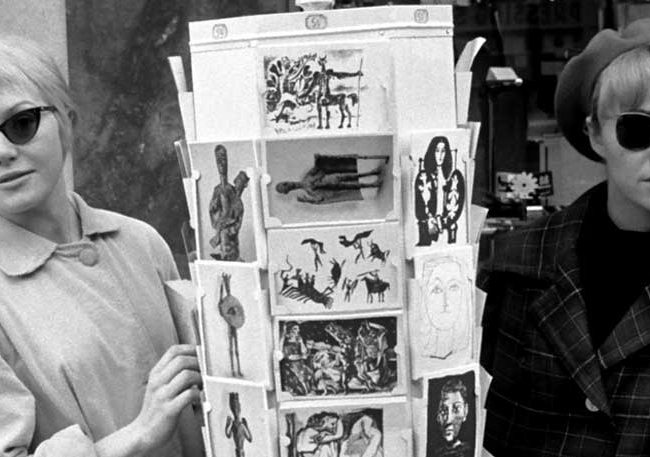
(The Loneliest Planet is now available on DVD through MPI Home Video. It was distributed theatrically by Sundance Selects.)
The New Auteurs Jury Prize at AFI Fest 2011 much deservedly went to Julia Loktev’s The Loneliest Planet, a film that has been playing to accolades on the festival circuit since its premiere at Locarno in August. One could defend the existence of The Loneliest Planet simply based on the beauty of Hani Furstenberg’s pulsating red hair contrasted against the vibrantly verdant Caucasus Mountains, though there’s much more going on here beyond swaths of color.
Loktev’s second narrative feature is a visual and emotional wonder to behold as she quietly, bracingly, unravels the story of Alex (Gael García Bernal) and Nica (Furstenberg), a young engaged couple that goes on vacation in Georgia. The other central character in this sparsely peopled story is Dato (Bidzina Gujabidze), whom they hire as a guide to lead them through the Caucasus Mountains. The first half of the film is an idyll. Their relationship is playful, loving, the coming together of soul mates. At a plateau in their climb they stand upside down on their heads and see how long they can stay that way. Around the campfire at night, Dato teaches them Georgian and Nica teaches him how to properly annunciate “I take my bitch to the beach.” For nearly the first half of their journey there are no night scenes, just one sun-filled day going into infinity.
 And then something happens to bifurcate the film. If the first half is about joy, play, and unity, then the second is about hurt, despair, and alienation. To go into detail about the cataclysmic event that occurs would be to unfairly give away a key element of the narrative. In Contempt, Michel Piccoli tells Brigitte Bardot to get into the car with Jack Palance’s sleazy producer and the effect of that one sentence on their relationship is akin to a hammer being dropped on a crystal egg. The “event” in this film is of greater consequence, but its effect on the relationship between Nica and Alex is no less damaging (at least initially).
And then something happens to bifurcate the film. If the first half is about joy, play, and unity, then the second is about hurt, despair, and alienation. To go into detail about the cataclysmic event that occurs would be to unfairly give away a key element of the narrative. In Contempt, Michel Piccoli tells Brigitte Bardot to get into the car with Jack Palance’s sleazy producer and the effect of that one sentence on their relationship is akin to a hammer being dropped on a crystal egg. The “event” in this film is of greater consequence, but its effect on the relationship between Nica and Alex is no less damaging (at least initially).
Space plays an integral part in relaying the developing nuances of the story. The physical distance between people is directly correlative to the emotional gaps between them. Loktev arranges a variety of wide shots to illustrate the gaping holes between these three traveling bodies as they push forward through the mountains while trying to reconcile the recent past. If the first half of the film is filled with joyful chatter, the second is reigned by silence. Loktev carefully traces the shifting dynamics between Nica and Alex as they try to fins a way to re-inscribe themselves within their relationship. A particularly stirring scene is one in which Alex follows Nica around an old abandoned house in the mountains as she makes her way silently from room to room, carefully avoiding his presence. With Alex close behind, the camera follows her into a room and moves in slowly to the back of her neck as Alex tentatively, carefully, reaches out a hand, longing for contact, forgiveness, closeness. Ultimately, what makes The Loneliest Planet resonate so deeply is that it is a film about hope for love and the ability of people to take steps in overcoming what has set them apart.
— Veronika Ferdman












Anmk215
The film seems very interesting.
Pingback: A Conversation With Julia Loktev (THE LONELIEST PLANET) – Hammer to Nail
Pingback: THE 2012 HAMMER TO NAIL AWARDS – Hammer to Nail
Pingback: HOME VIDEO PICKS – Hammer to Nail